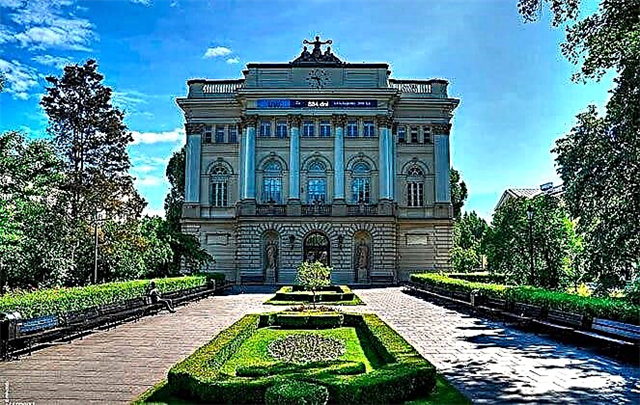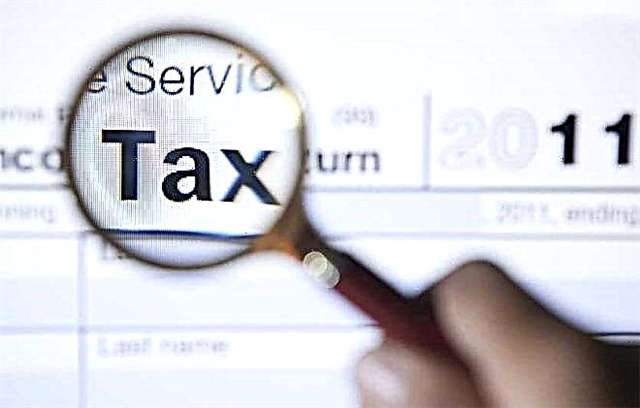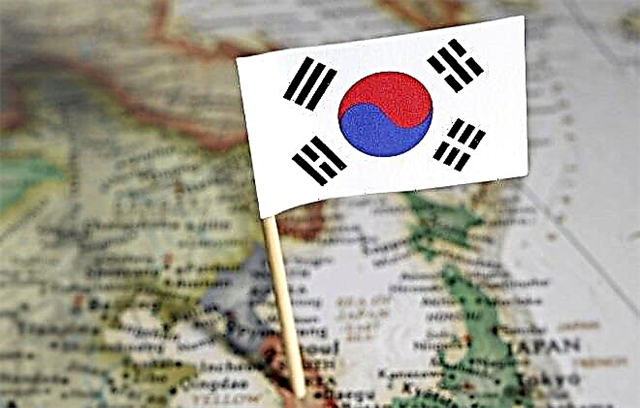Moving to South Korea attracts businessmen, students, and those who simply want to live in a country where technological progress is developing at a rapid pace. But it should be remembered that immigration to Korea is associated with adaptation to a completely different mentality, learning a difficult language and with the difficult process of obtaining citizenship.

Let's understand the terminology
When planning a move, it will be correct to understand first some of the terms. Immigration is an entry into another state for permanent residence with a clear purpose. It is often confused with migration and emigration. The first is the resettlement of citizens within the state, the second is the departure of residents of a certain country abroad with the intention of settling in a foreign territory.
For the implementation of the project, how to go to live in South Korea, it is not enough just to desire. You will need good reasons, which will have to be documented.
Korea's migration legislation is considered one of the harshest in the world. Although in recent years there have been some relief in the form of expanding the list of visas giving the right to permanent residence in the country.
Legalization begins with obtaining an immigration visa. Upon arrival in the country, a foreign citizen must submit a request for a residence permit - a temporary residence permit. This type of document allows you to live in the state for a long time, work, study, and enjoy some of the benefits available to permanent residents.

Having lived in the country for a certain number of years, the candidate can apply for permanent residence - permanent residence. This status practically equals the rights of a migrant with those enjoyed by citizens of the state, with the exception of the opportunity to vote, hold government posts and serve in the army.
Having lived on the basis of permanent residence for several more years (the period is set by each country individually), having learned the state language, showing himself to be a law-abiding person with a constant income and place of residence, a foreigner can apply for citizenship.
A little about the quality of life in Korea
South Korea today is one of the most developed countries in Asia and is consistently among the twenty states with a high level of economy and technological progress in the world. You can draw a conclusion about whether it is worth moving to Korea based on the following facts:
- the death rate of newborns in the republic is only 4 babies for every thousand;
- the average life expectancy of South Koreans is 80 years;
- the country has a very low crime rate;
- Korean medicine is one of the best in the world.
Top-tier professionals can count on good returns that rival Japan today and outpace those of other Asian neighbors. The same factor determines high prices in Korea for all groups of goods and services.
For example, the cost of 1 square meter of living space in Seoul in a residential area is 5-9 thousand US dollars. Renting a one-bedroom apartment not in the city center will cost about $ 400; in the central part of the capital, you need to count on an amount of at least $ 700.
Average earnings in Korea are approximately $ 3,300-3,400 (221-227 thousand rubles at the current exchange rate). But, according to the reviews of those who have already lived here for some time, this amount will not be enough to support themselves and their family. Average monthly expenses are around $ 5,000.
Basic ways to immigrate to Korea
 Since April 2021, a visa-free regime has been in effect between the Russian Federation and Korea, allowing Russians to stay on Korean territory without special permits for 60 days.
Since April 2021, a visa-free regime has been in effect between the Russian Federation and Korea, allowing Russians to stay on Korean territory without special permits for 60 days.
If the purpose of entering Korea is employment, study or long-term residence, then, in accordance with paragraph 2 of article 2 of the Agreement on visa-free border crossing between the two states, you will have to obtain a document that gives the right to do so.
Those who are interested in how to stay and live in Korea need to have a reason to move. These include:
- Doing Business. To emigrate in this way, you will have to submit a detailed business plan for upcoming activities to the authorized department for consideration. If the Ministry of Economy approves the project, the candidate will receive a long-term visa, which will enable him to apply for a residence permit.
- Investments. This path is available to migrants only if they invest in the economy at least 500 million Korean won (retirees over 55 will need 300 million). As for the purchase of real estate, everything will depend on its value. If the price exceeds 500 million won, the authorities will also consider this as one of the investment methods and will immediately issue permanent residence. If the cost turns out to be lower, then such a purchase will simply become an advantage when applying for a residence permit.
- Professional immigration. Suitable for those who want to work in Korea. This republic is interested in brain gain. Here programmers, engineers, designers, scientists, biotechnologists are in demand. To obtain a residence permit on the basis of employment, a foreigner will need an employment contract with a South Korean company. Since the priority in choosing an employee is given to local residents, the contract and the candidacy of a foreigner must be agreed with the Ministry of Labor. And for this, the company will have to prove that there was no suitable employee among the Korean citizens. A residence permit is issued for a period of one year with the right to extend it for another two. After 3 years, the foreign worker can apply for permanent residence. The established three-year period is not mandatory for executives and managers of large international companies. Residence permit for labor migrants also gives the right to move their families to Korea with the right to work.
- Reuniting with relatives. This method is available to those who have parents, grandparents, brothers or sisters living in Korean territory. It is compulsory for the host country to be required to hold Korean citizenship for at least 5 years at the time of the application for the transfer of relatives. The invitation is certified by the Department of Migration of the Republic of Korea (RK).
- Marriage to a Korean citizen. Persons migrating on this basis will be able to obtain citizenship after 3 years of residence in the country (immediately after marriage, a foreign spouse or spouse receives permanent residence). Korea only recognizes formal marriages. If the marriage is registered outside the country, it will have to be legalized.
- Moving ethnic Koreans. To return the native citizens of the country, the government has developed several programs. To use them, you need to prove your Korean origin and pass the Korean language proficiency test. A residence permit is issued for 5 years, but such a document does not allow its holder to stay outside Korea for more than three months a year. But after 5 years, an ethnic Korean will be able to obtain citizenship without applying for permanent residence.
- Studying at a Korean university. To obtain a residence permit, you need to provide a contract with the university, which will detail the curriculum, terms and cost of studies. A student residence permit gives you the opportunity to earn extra money: for 20 hours during the educational process and 40 hours during the holidays.
- Emigration for refugees. To obtain refugee status, it will be necessary to prove that the applicant cannot return to his homeland due to persecution that threatens his life.
Other means of emigration include long-term treatment in the country, participation in volunteer programs or research projects.
How is the immigration process
 Legalization in Korea for foreign citizens takes place in several stages:
Legalization in Korea for foreign citizens takes place in several stages:
- Obtaining a long-term visa.
- Registration of a residence permit.
- Permanent residence request.
- Obtaining citizenship.
Whether the candidate will have to go the full path or he will have the opportunity to shorten it, depends on the basis of the migration. Let's look at the process step by step.
We issue a residence permit
A residence permit in South Korea is issued by the Department of Migration. Representatives of this department can be found at any police station in the country. Residence permit refers to documents that require renewal. This is usually done no later than a month before the expiration of the current permit.
A residence permit is issued if you have a long-term visa and a reason for moving, which must be confirmed by the relevant documents.
A residence permit is usually issued for a year with the right to extend it for 2 years. After the end of the three-year period, the holder of the temporary status is obliged to leave the country or proceed to the next stage of legalization.
In the process of considering a request, you need to be prepared for the fact that the department will need coordination with other authorities - the Ministry of Labor, the Ministry of Education or Health (depending on the method of immigration). Immediately upon arrival in Korea, a foreign citizen who intends to live here for more than 60 days must register at the police station.
If we remember that Korea is a country of high technologies and the Internet can be found everywhere here, it will not be surprising that foreigners can solve many issues on the visa portal of the Republic of Kazakhstan.
Obtaining permanent residence
To proceed to the next stage and obtain permanent resident status, you must have lived in the country for at least 3 years on the basis of a residence permit. Some categories of applicants may not adhere to this rule and move to Korea for permanent residence right away, but this will require special permission from the government.
A permanent residence permit does not have a validity period and does not oblige a foreign citizen to decide what to do next - to apply for citizenship or return home. But the status must be confirmed every 10 years.
The confirmation procedure is free. All should contact the same department - the Department of Migration.
The authorities of the republic can deprive a foreigner of permanent residence for non-compliance with the rules of stay in the country - a migrant must have lived in Korea for more than 5 years in a row. If during this time he never appeared on the territory of the state, then he will certainly lose his status.
Korean Citizenship
The citizenship request is the final step in the legalization process. To be able to apply for a Korean passport, a number of requirements must be met:
- Have a regular, legitimate source of income (no limit on the amount).
- Own real estate or rent a house for a long time.
- Do not have dangerous diseases.
- Be law abiding.
- Learn Korean.
- Give up previous citizenship.
South Korea does not recognize a second citizenship. Therefore, you will either have to submit a request to withdraw from the number of citizens in your homeland, or be content with the status of permanent residence. Ethnic Koreans are an exception.
Take a sociological survey!
[yop_poll id = ”9 ″]
What documents will be needed
 After the method of emigration has been determined, the next thing you need to move to Korea is a certain package of documents. To apply for a residence permit, you must prepare:
After the method of emigration has been determined, the next thing you need to move to Korea is a certain package of documents. To apply for a residence permit, you must prepare:
- Statement.
- A foreign passport, which must be valid for at least a year.
- National passport with copies of all pages on which there are records.
- Proof of marriage or dissolution.
- Medical certificate of health status.
- Proof of financial condition. This includes a bank statement that you have at least 30 million won (almost $ 25,000). Migrant workers can provide an employment contract that specifies the salary.
- An agreement to rent or own a home.
- Four photographs.
- Autobiography.
Depending on the migration method, additional documents must be prepared:
- confirmation of kinship with Korean citizens;
- birth certificates of children;
- an invitation from a university, etc.
All submitted documents must be accompanied by a translation into Korean, certified by a notary.
When submitting a request for permanent residence, it is necessary to add a confirmation that the applicant has a legitimate source of income to the specified list of papers, as well as a certificate that all this time he has strictly paid all taxes to the budget.
To apply for the citizenship of the Republic of Kazakhstan, as mentioned above, you will need proof that the application for renunciation of the previous citizenship has been sent to the authorized agency in the candidate's homeland.
Timing and cost at different stages
How much money and time it will take to get the desired status depends on the stage of legalization. When applying for a residence permit, it usually takes a month for consideration. Extension of temporary status is considered the same amount. That is why it is necessary to submit papers for the prolongation of a residence permit no later than 30 days before its expiration.
But sometimes the process can take two months. It depends on the workload of the migration department.
It takes at least three months to resolve the issue of granting permanent status. Given this circumstance, documents for permanent residence must be submitted three months before the moment when the residence permit expires.
But a request for citizenship can take from 8 to 24 months.
For each of the stages, you will need the following budget:
| Service | Price in Korean won | Price in USD |
|---|---|---|
| Initial obtaining a residence permit | 200000 | 170 |
| Prolongation of residence permit | 100000 | 85 |
| Obtaining permanent residence | 500000 | 430 |
| Confirmation of permanent residence | is free | is free |
| Obtaining citizenship | 300000 | 250 |
Why can they refuse
Refusals to foreigners by the migration services of South Korea are not uncommon. The basis may be:
- incomplete package of documents;
- inaccurate or false information;
- having a criminal record at home or in South Korea;
- service in the police, army or special services of other states;
- suspicion of supporting international terrorist or criminal groups or participating in their activities;
- violation of the migration laws of Korea;
- insufficient financial support or doubtful origin of funds.
The refusal can be appealed to the Supreme Court of South Korea. You must submit a petition no later than two weeks after receiving a negative answer. In this case, a certificate from the court will serve as a document confirming the legal stay of a foreigner in the country.
Where is the best place to live in Korea
 Emigration to Korea from Russia should take into account another important point - the place of residence. When choosing a city where to move, one should take into account its location, the possibility of finding a job in it, the standard of living and security within it.
Emigration to Korea from Russia should take into account another important point - the place of residence. When choosing a city where to move, one should take into account its location, the possibility of finding a job in it, the standard of living and security within it.
The most unsafe cities in Korea are considered to be cities in which there is a large concentration of migrant workers. But most of the Russians live in the following settlements: Gwangju, Ansan, Ulsan, Suwon, Busan.
If we consider the Korean regions from the perspective of employment prospects, then you need to pay attention to:
- Seoul - attracts professionals of the highest category, and service workers, and workers. The city has a Russian district located near the Dongdaemun History and Culture park subway station. There is indeed a lot of work in the capital, but it should be remembered that prices for all goods and services are much higher here than in other cities.
- Daegu - located in the southeastern part of the state, not attractive to tourists. There are many metallurgical, textile and machine-building enterprises on its territory.
- Daejeon is a concentration of research and development companies.
But for migrants who like the tourism business, it is best to choose Korean resorts: Jeju, Geoje, Incheon, Muan.
Outcomes
You can immigrate to South Korea on different grounds. Most often, foreigners choose to work, get married, study or invest.
The legalization process begins with obtaining a long-term visa, then a residence permit, permanent residence, and only then citizenship.
The main requirements for candidates are: having a legal source of income, proficiency in the Korean language, no criminal record or dangerous diseases, documentary evidence of the basis for migration.











